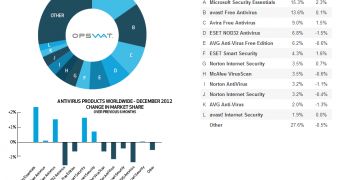The title may sound a bit weird given the fact that the anti-virus market was believed to be dominated by world-renowned companies such as Kaspersky and ESET, but that’s exactly what a new study published by research group Opswat claims.
Microsoft is the number one anti-virus vendor in the world, with a market share of 20 percent, while Avast comes second with 18.3 percent in a top concerning security tools with real-time protection enabled.
What’s more, the report claims that Microsoft’s Security Essentials is the second top choice when it comes to worldwide anti-virus protection, as it holds a share of 16.8 percent, more than ESET NOD32 with 10.8 percent and Symantec with 10.5 percent.
AVAST continues to lead the market with a market share of 17.5 percent, the report shows.
As for security products, Microsoft Security Essentials is the top choice with a 15.3 percent share, while avast! Free Antivirus comes second with 13.6 percent. Popular security solutions such as ESET NOD32 and Norton AntiVirus are currently installed on 6.8 percent and 3.2 percent of worldwide computers, respectively. Kaspersky’s anti-virus solution isn’t even included in this top.
“[Microsoft’s growth] is something to be aware of, as with all competition,” Chris Doggett, vice president of channel sales, North America, at Kaspersky Lab ZAO, was quoted as saying by ChannelNomics.
“It’s a call for partners to focus on recommending products and solutions that meet the needs of their customers best, as opposed to simply the top ranked product for a particular feature or benefit.”
According to Opswat, the data was collected between November 16, 2011 and November 15, 2012 and “features comparisons across the two 6-month periods spanning these dates.”
This means that the report was conducted before Windows 8 came out, but Microsoft’s new OS shouldn’t make any difference since it’s currently installed on only 1.46 percent of the computers worldwide.

 14 DAY TRIAL //
14 DAY TRIAL //